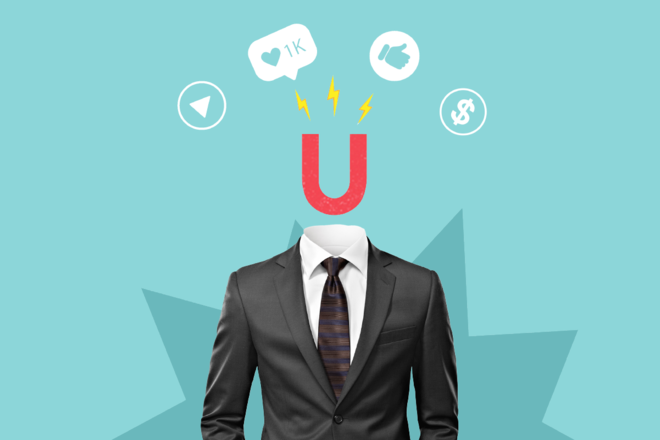
These days when people think of influencers, their thoughts immediately jump to TikTok or Instagram socialites, championing a variety of consumer products. But the fact is, business-to-business influencers have been present in marketing for longer than their business-to-consumer counterparts and may be even more critical to the success of B2B brands.
Historically, influencers in a B2B capacity were networkers who sat on boards across numerous firms, and streamlined introductions between different organizations. That is still true to this day, but it has been expanded to include thought leaders leveraging their social-media following to influence corporate and small-to-medium-size audiences in purchasing new products or discovering new services. In addition, B2B influencers streamline a brand’s ability to reach new audiences, thus increasing brand awareness and propelling a business’ positioning as an industry leader.
Primarily, B2B influencers reside on four main platforms: Linkedin, Twitter, YouTube and TikTok, and each platform has a different style of content that supports different marketing functions. For example, Linkedin and Twitter offer more content geared toward thought leadership and innovation, through articles, static posts or tweets. TikTok, meanwhile, prioritizes content toward corporate culture, comedy and enterprise entertainment through short videos. And YouTube is oriented more toward education and skill development in long-form tutorials.
The B2B influencer marketing vertical has the potential to generate $11.7 billion in revenue by the end of 2022, with more than 38% of B2B companies currently exploring influencer marketing as a new lead-generation avenue. Influencer marketing is set to become a mainstream approach for B2B companies that are looking to tap into the power of social media and content marketing.
Let’s see how some B2B brands used these influencer platforms successfully.
Humor and engagement Vimeo accelerated its lead generation through influencer marketing on TikTok by leveraging creators who speak to a broad corporate American audience. Creators generated humorous content about corporate work culture during the work-from-home period that was relatable to everyone living in a post-COVID world.
More brands should take advantage of TikTok’s ability to gain higher user engagement per post by creating short, catchy videos that showcase their organizations’ culture, encouraging audiences to connect with their brands on a more personal level.
Amazon Web Services utilized influencers in the back-end developer niche to increase the awareness and utility of its tech stack, using tweets and retweets surrounding updates to its infrastructure. Twitter offers brands a medium for higher output frequency without diluting their core messaging, and influencers play a role in amplifying that form of communication even further.
Intuit Quickbooks launched a YouTube content series with influencers in the accounting niche as hosts, educating SMB audiences on accounting basics related to running and growing their businesses. In the U.S., if someone were to search on YouTube for the phrases “financial projections” or “breakeven cost,” they’ll be greeted with Quickbooks tutorials. YouTube is one of the most powerful marketing channels for brands in B2B and B2C, especially if it pertains to a very niche subject matter.
Further, brands are beginning to expand their SEO initiatives from solely digital on Google to social and digital SEO through YouTube. Media consumption habits have changed quite dramatically over the last few years, with one-third of internet users having watched a tutorial or how-to video every week this year so far. This in turn presents a perfect opportunity for brands to provide resources and value through influencers on YouTube to introduce new products or services. The reason: 90% of people say they discover new brands or products on YouTube.
Although platforms have different consumption habits, there is some overlap between them. Creators from TikTok or YouTube reshare content on Linkedin or Twitter to further amplify their reach and ensure that qualified audiences or decision makers are able to discover this content effectively. Many B2B influencers utilize a method of cross-platform content sharing to test and learn about which content first performs best on a broad social media platform, and then to reshare the content with B2B-qualified audiences.
LinkedIn, with around 61 million senior-level influencers and 40 million decision-makers from all different industries, provides the unique opportunity for influencers to directly impact the audience responsible for making major company decisions. Reportedly, 80% of B2B leads come from LinkedIn; in addition, 90% of B2B marketers claim to have reduced cost-per-lead using LinkedIn lead-generation forms.
Honing your influencer content With such a high opportunity for conversion, brands and influencers need to ensure their content is perfect for their target audience before sharing it. It’s recommended that companies test their content across other platforms, first to solidify the best approach and then to share it on LinkedIn to reach their desired target audience.
A great example of an influencer who leverages this form of cross media amplification is Tim Davidson, a B2B marketing influencer who creates entertaining content surrounding B2B sales and marketing processes.
In parallel to brands leveraging external B2B influencers, many are prioritizing internal influencer campaigns by placing an emphasis on their employees and customers. Alex Su, head of community development at Ironclad, is a great example of how an internal influencer plays a role in B2B marketing and community development. His content provides entertaining outlooks on corporate law, speaking to an audience with a legal background but in a casual way. The value he provides is entertainment, which in turn keeps himself and Ironclad top of mind in association with legal SaaS.
B2B sales and lead generation is never an impulse lead-buying scenario as we might see with B2C markets. So brands need to leverage influencers to maintain awareness, provide value and be memorable, in order for target cohorts to know who to turn to when the opportunity arises.